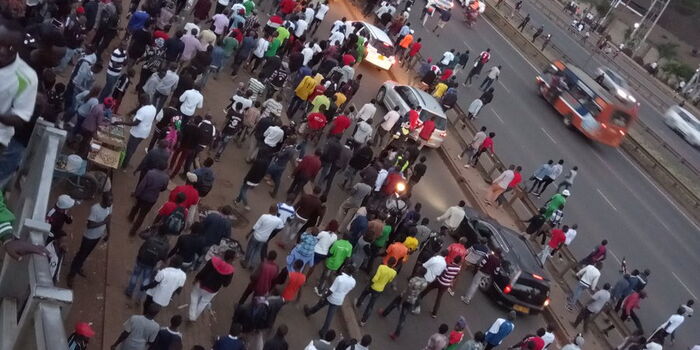 When John Kiarie was beaten by the crew of Marimba Sacco at Zimmerman and later died in hospital in December last year, it took the police more than three days to arrest any suspects. His family is still fighting for justice.
When John Kiarie was beaten by the crew of Marimba Sacco at Zimmerman and later died in hospital in December last year, it took the police more than three days to arrest any suspects. His family is still fighting for justice.
And when John Kamau, the conductor of a Mwiki Sacco Ltd bus died after being assaulted by Sacco inspectors “for overcharging passengers”, he became the latest casualty of the lawlessness that characterises the city’s public transport.
Even after the National Transport and Safety Authority (NTSA) banned all the sacco’s matatus from operating, they were back on the road in less than a week.
Matatus are controlled by unruly gangs who masquerade as route controllers. In Kasarani, for instance, they control the bus stops at Sunton, Hunters and Mwiki. They sit in groups chewing miraa awaiting their turn to “direct” the hundreds of buses that ply the route.It is a common to board a bus that has more crew members than necessary, thuggish men who readily insult passengers, and sometimes steal from them in broad daylight.
They sit in groups chewing miraa awaiting their turn to “direct” the hundreds of buses that ply the route.It is a common to board a bus that has more crew members than necessary, thuggish men who readily insult passengers, and sometimes steal from them in broad daylight.
The police, who are supposed to maintain order on the roads, abet brazen flouting of traffic rules, and those governing public order and safety.
On Moi Avenue, for instance, matatus pick up passengers and do u-turns in the middle of road before speeding off.All this happens in the full glare of the police and the city county traffic marshals, as CCTV cameras record.While one would expect heads to roll, strangely, no action is taken against the lawbreakers, which has only emboldened them. Analysts have repeatedly argued that getting matatus off the road and introducing commuter trains is the only way to bring order in the city’s transport system.
Analysts have repeatedly argued that getting matatus off the road and introducing commuter trains is the only way to bring order in the city’s transport system.
But this is not as simple as it appears, says a senior cop who requested anonymity.
“Such a strategy would ruffle many feathers for the simple reason that most matatus are owned by powerful people in the hierarchy of the police and government,” he told the Nation.
It is a dizzyingly intricate network whose shots are called by senior police officers and city millionaires.The police, who collect worn Sh50 notes from motorists and the youth who harass commuters, he says, are simply errand boys “who dance to the tune of their bosses high up the food chain to make ends meet”.
The bribe goes upstream in a “chain of custody” and ends up with senior police officers. “They split the loot according to rank and what role one plays in perpetuating the insanity in public transport,” he adds.
It is no wonder, then, that while police bosses live lavishly, their juniors, who collect millions of shillings on the road daily, remain poor throughout their careers.
One informer told the Nation that the department is a battlefield, with senior officers fighting to control certain city routes.
“The higher the number of traffic officers who work under you, the more money you fetch,” says the informer.
Besides the police, vicious estate-based gangs profit from the business, demanding cash from the crew depending on the number of trips each vehicle makes per day. Buses plying the Kasarani, Buruburu and Dandora routes pay a daily fee of between Sh50 and Sh200 to cartels to use the route and bus stops on it. Sources privy to their operations say the gangs hold immense sway within the matatu saccos and the police.
“The youths hang around bus stops, including in the CBD, to ensure that all vehicles have paid the illegal dues and readily rough up the driver if he fails to part with the fee,” a source in Kariobangi told the Nation.But there is no uglier scene than a clash between rival gangs when they cannot agree on how to share the loot.
“They will intercept the bus and stop it anywhere. They harass the crew and passengers alike, and will not leave until they have received their dues,” says Mike Irungu, a resident of Githurai, adding that buses are sometimes forced to part with money to different vigilante groups to avoid trouble.
By introducing NYS buses on the Kibera, Githurai, Mwiki, Mukuru, Dandora, Kariobangi and Kawangware routes in March, the government hoped to ease the transport chaos, but they have not made much of an impact.